january-top.html
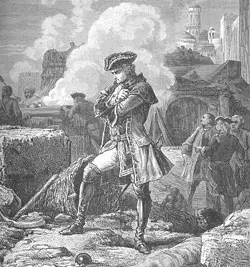 1702 Thomas Arthur Lally was born in Romans, France on this day in 1702. His father was a respected soldier in the Irish brigade of the French army. King Louis XV offered to make Lally a colonel when he reached 18, but his father insisted he progressed on his own merit.
1702 Thomas Arthur Lally was born in Romans, France on this day in 1702. His father was a respected soldier in the Irish brigade of the French army. King Louis XV offered to make Lally a colonel when he reached 18, but his father insisted he progressed on his own merit.
Lally proved himself to be a skilled soldier in his early campaigns and quickly rose through the ranks of the French army.
He was given command of his brigade for a battle with the British in India. However, the government did little to support him and his men were easily defeated.
Lally was taken prisoner by the British but allowed to return to France. There he was found guilty of improper conduct in India and beheaded.
* * *
1835 Patrick Guiney was born in Tipperary on this day in 1835. He was taken to America by his father as a child and studied criminal law before entering into politics.
He volunteered himself to fight after the outbreak of the American Civil War, and within a couple of years was made commander of his regiment. Guiney fought in more than 30 battles and shone as a soldier and a leader, without ever suffering serious injury
However, he was shot in the face at the Battle of the Wilderness 1864. His left eye was destroyed and it was thought that the injury would kill him. Guiney gave the order to operate on him before he completely lost consciousness, but against all odds, he survived. He was honourably discharged from the conflict and received an award for gallant and meritorious services during the war after being nominated by President Johnson.
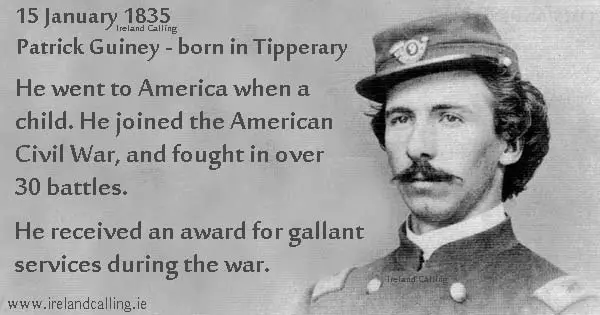
* * *
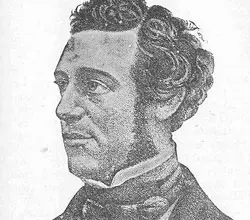 1861 Terence MacManus died on this day in California in 1861. He was one of the Young Irelanders that took part in the rebellion against the British in 1848.
1861 Terence MacManus died on this day in California in 1861. He was one of the Young Irelanders that took part in the rebellion against the British in 1848.
He was spared the death penalty, instead being sent to work Van Diemen’s land in Australia for the rest of his life.
However, he escaped from the labour camp and fled to America where he lived out the rest of his life.
Click here to read about the history of the song, Van Diemen’s Land and watch videos
* * *
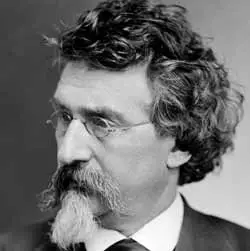 1896 Mathew Brady died on this day in 1896. He was an Irish American photographer who recorded the American Civil War first hand by taking cameras on to the battlefields.
1896 Mathew Brady died on this day in 1896. He was an Irish American photographer who recorded the American Civil War first hand by taking cameras on to the battlefields.
He was granted permission to shoot the war by President Lincoln on the condition that he funded the trips himself.
He got so close to the conflict that he narrowly escaped capture at the First Battle of Bull Run. Thereafter, Brady rarely visited the battlefield personally, instead hiring assistants to capture the conflicts.
Brady spent more than $100,000 collecting photos, with the expectancy that the US government would buy them off him once the war had ended.
However, they refused to do so, and Brady was left bankrupt. He then lost his eyesight and his wife died, leaving Brady to live out the rest of his life lonely and miserable.
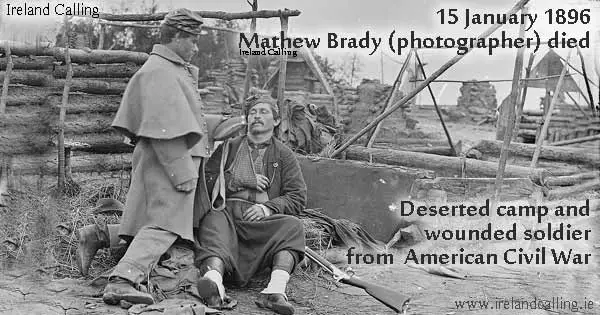
* * *
1961 On this day, 15 January 1961, Damian O’Neill was born in Belfast. He was the lead guitarist in the pop-punk band, The Undertones before they disbanded in 1983, then rejoined them in 1999 when they reformed. The band were successful in the 1970s and 80s, with their most famous hits being Teenage Kicks and Here Comes the Summer.
Teenage Kick’s, John Peel’s favourite song, was played at his funeral.
* * *
1965 Happy birthday to James Nesbitt, born on this day in County Antrim in 1965. The actor has been a familiar face on British television in various roles, since he starred in ITV comedy drama Cold Feet in the mid-90s.
James Nesbitt’s guided tour of Ireland
* * *
1988 Sean McBride died. He was an Irish politician and human rights activist, who helped found Amnesty International. In 1974, he was awarded the Nobel Peace Prize. He also received the Lenin Peace Prize for 1975–1976 and the UNESCO Silver Medal for Service in 1980.
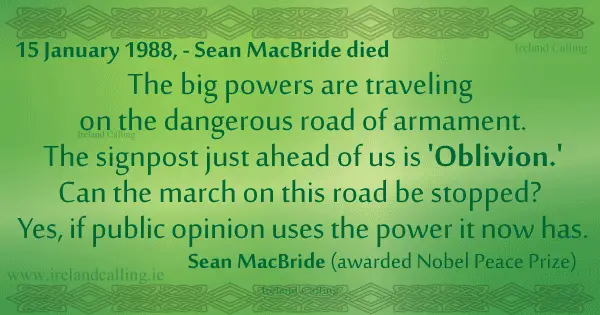
He was born in Paris and was the son of Major John MacBride and Maud Gonne (Yeats’ muse). When he was 12, he went to live in Co Wexford. He joined the Irish Volunteers and took part in the Irish War of Independence. He was jailed by the Irish Free State during the Civil War.
During the 1950s, 1960s and 1970s, MacBride worked for human rights worldwide. He awarded the Nobel Peace Prize in 1974, and was described as a man who “mobilised the conscience of the world in the fight against injustice”.
He died on 15 January 1988, eleven days before his 84th birthday. He is buried in Glasnevin Cemetery with his mother and wife.
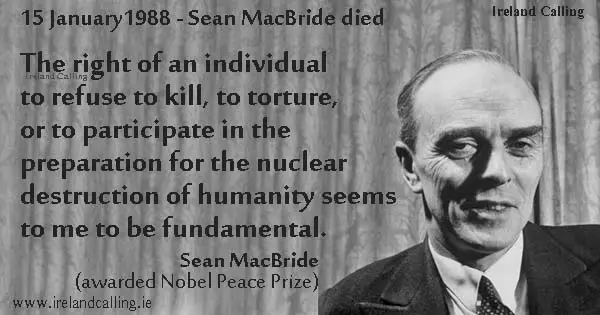
january-bottom.html
